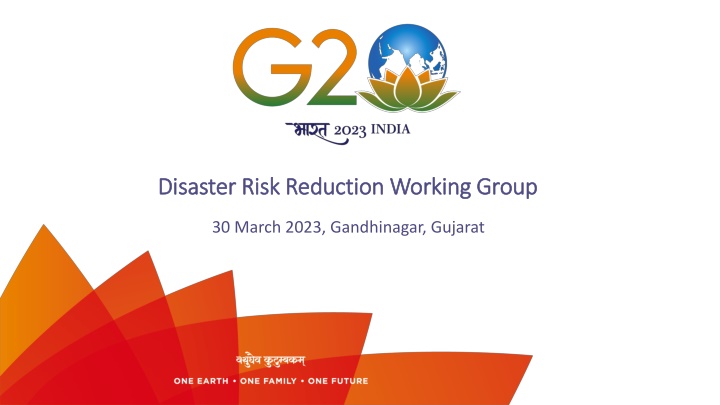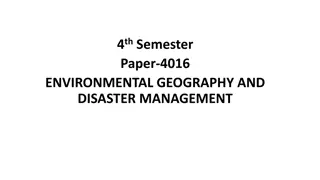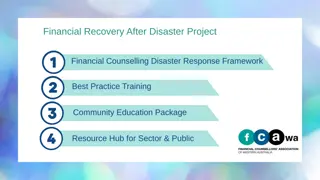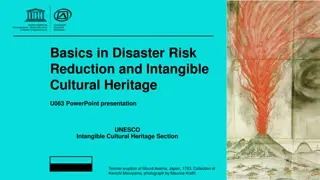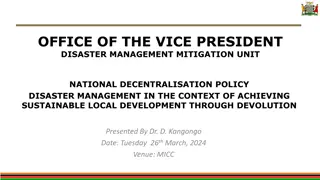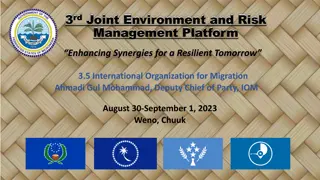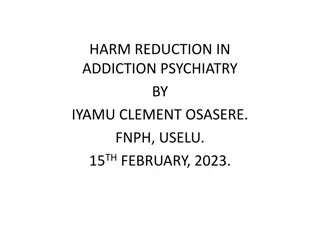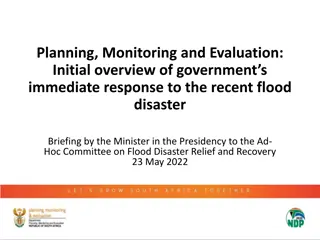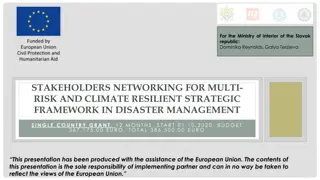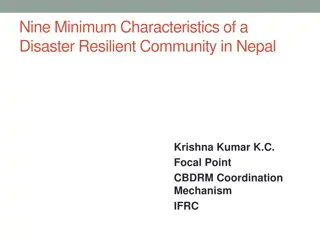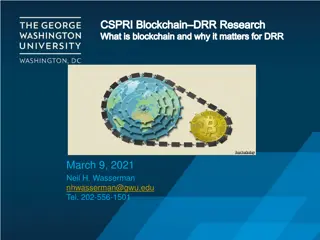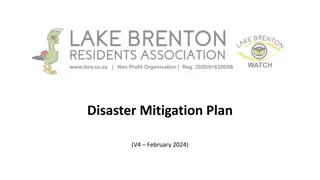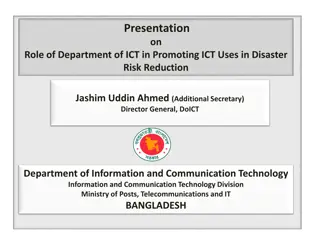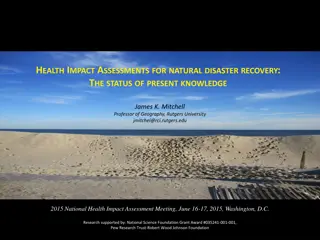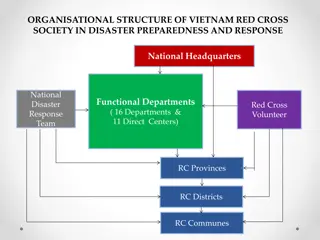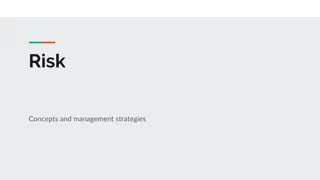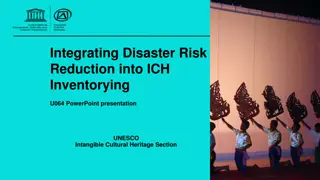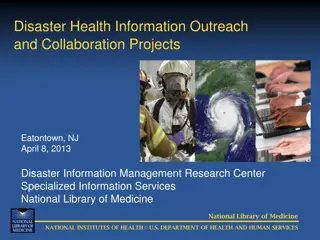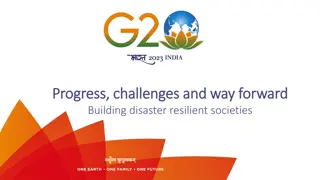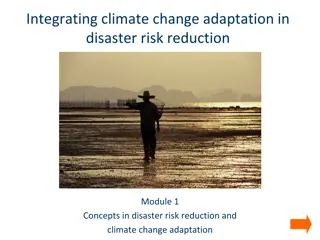Global Initiatives for Disaster Risk Reduction in Gandhinagar
The Disaster Risk Reduction Working Group (DRRWG) in Gandhinagar, Gujarat, is focusing on priorities such as early warning systems, resilient infrastructure, financing, disaster response, and recovery. There is a strong emphasis on the connection between disaster risk reduction and sustainable development goals, with a specific focus on climate change adaptation and geophysical hazards. The group is part of the larger global context, including engagement with the G20 and efforts to reduce average annual losses from disasters. Key priorities include enhancing early warning systems, investing in resilient infrastructure, strengthening financial frameworks, improving disaster response systems, and implementing ecosystems-based approaches for reducing disaster risks.
Download Presentation

Please find below an Image/Link to download the presentation.
The content on the website is provided AS IS for your information and personal use only. It may not be sold, licensed, or shared on other websites without obtaining consent from the author.If you encounter any issues during the download, it is possible that the publisher has removed the file from their server.
You are allowed to download the files provided on this website for personal or commercial use, subject to the condition that they are used lawfully. All files are the property of their respective owners.
The content on the website is provided AS IS for your information and personal use only. It may not be sold, licensed, or shared on other websites without obtaining consent from the author.
E N D
Presentation Transcript
Disaster Risk Reduction Working Group Disaster Risk Reduction Working Group 30 March 2023, Gandhinagar, Gujarat
Global context G20 context Priorities of DRRWG and Road Map Early Warning Systems Disaster and Climate Resilient Infrastructure Financing DRR Disaster Response & Recovery (BBB) Ecosystem based approaches AGENDA FOR DISCUSSION DRRWG s linkages with other Working Groups
Global Context 4 loss reduction targets Sendai Framework for Disaster Risk 1 Development of deliverables Reduction 3 capacity development targets slow progress on 6 of the 7 targets At least 11 of the 17 Sustainable Development Goals can not be achieved without disaster risk reduction Sustainable Development 2 Development of deliverables Goals SDG 9 (Industry, Innovation and Infrastructure) and SDG11 (Sustainable Cities) directly linked Development of deliverables Adaptation Climate Change 3 Enhanced Disaster Risk Reduction efforts are essential for Climate Change Adaptation Development of deliverables 4 Geophysical Hazards Global Disaster Risk from geophysical hazards is very high
G20 Context: Disaster Risk Reduction Expected Average Annual Loss from disasters: $218 billion ~ 9% of annual G20 investment in infra Success in saving lives but not livelihoods High risk of hydro-met and geo-physical disasters High disaster mortality risk as well as economic loss risk Technical capacity to serve the world e.g. in Early Warning Systems Opportunity to work across sectors through other Working Groups Build on past discussions on Disaster Risk Reduction in G20
Priorities of DRRWG Global coverage of Early Warning Systems for all hydro-meteorological disasters Increased commitment to disaster and climate resilient infrastructure systems Stronger national financial frameworks for increased public and private sector investment in DRR; and robust disaster risk finance mechanisms Strengthened national and global disaster response and recovery systems including build back better Increased application of ecosystems-based approaches to disaster risk reduction
1. Early Warning Systems Disaster risk knowledge, based on systematic collection of data and disaster risk assessments (20%) Detection, monitoring, analysis and forecasting of hazards and possible consequences (31%) Dissemination and communication, of authoritative, timely, accurate and actionable warnings, and associated information on likelihood and impact (42%) Preparedness at all levels to respond to the warnings received (27%)
1. Early Warning Systems Financing Early Action: Compendium of fit-for-purpose and fit-for-budget early warning business models that are more anticipatory, accessible to a broader range of EWEA stakeholders (by June 2023) Regional and sub-regional plans of action Complement the UNESCAP Study with regional analysis of other regions (by June 2023) Digital platform for knowledge sharing Structure around the four sub-systems Particular emphasis on gap areas (Risk Knowledge and Preparedness/ Early Action)
2. Disaster and Climate Resilient Infrastructure Infrastructure as a driver of sustainable development, economic growth (and recovery); opportunity to transform the future Target D is the least reported target under SFDRR Systems vs Sectoral approach to Infrastructure Uncertain risk scenarios over the life cycle of the infrastructure systems Transitioning infrastructure Systems Standards and Codes still being developed Regulatory environment is evolving Regulation/ certification of professions
2. Disaster and Climate Resilient Infrastructure Inventory of infrastructure risk assessment tools and data platforms Training and capacity building of potential users Adapting existing tools to local, national and sectoral context Use case examples of decision making at the national and sub-national levels (July 2023 with a preview by May 2023 ) Compendium of good practices on disaster resilient infrastructure Resilient transitioning infrastructure systems (July 2023) Framing a study of different models of regulatory frameworks for resilient infrastructure systems (July 2023)
3. Financing frameworks for DRR: increasing public & private investments Mainstreaming vs. Ring-fencing DRR Financing Legal and Formal Framework for DRR Financing Diversified financial frameworks Address the entire spectrum of Disaster Risk Management needs Accountability and Transparency: measuring outcomes Pursue it as a shared responsibility All the levels of government national, sub-national, and local NGOs, Private Sector, and Civil Society Insurance, Banks, and Microfinance Sector Philanthropy, Crowd funding, and Remittances
3. Financing Frameworks for DRR Side event in the margins of the next DRRWG meeting to explore disaster risk financing Second half of May 2023 A compendium of good practices on financing of disaster risk reduction efforts (public and private sector) By July 2023 Compendium of good practices on legal and regulatory arrangements for financing disaster risk reduction By September 2023
4. Disaster response & recovery systems build back better Linkages between: Early Warning, Early Action and Financing Institutional mechanisms and capacities for assessing damages and losses and planning for recovery Predictable financing mechanisms for funding build back better Earmarked resources in national budgets CERF like mechanism for recovery? Risk transfer mechanisms/ Risk Pooling/
4. Disaster response & recovery systems build back better Good practices on financing build back better case examples of past events July 2023 Input paper on possible international and national financing mechanism(s) for supporting post-disaster recovery July 2023
5. Ecosystem based approaches Quantifying disaster risk reduction benefits of ecosystems Good practices on combining grey and green infrastructure Ecosystem-based approaches as an adaptive risk management strategy Analytical overview of linkages between regulations governing disaster risk management and ecosystems
Linkages with other Working Groups Environment and Climate Sustainability Working Group Energy Transition Working Group Infrastructure Working Group Development Working Group Sustainable Finance Working Group
Example: DRRWGs and ECSWG DRRWG Global coverage of Early Warning Systems 1. Making infrastructure systems disaster and climate resilient 2. Stronger national financial frameworks for DRR 3. Strengthened national and global disaster response systems 4. Increased application of ecosystems-based approaches to DRR ECSWG 1. Biodiversity, Land Degradation and Ecosystem Restoration 2. Sustainable and resilient Blue Economy 3. Resources Efficiency and Circular Economy.
Time Lines 1st Working Group Meeting: Gandhinagar, 30 March-1April 2023 Side Event on Early Warning, Early Action Side Event on Resilient Infrastructure 2nd Working Group Meeting: Mumbai, May 2023 Side Event on Disaster Risk Finance Side Event on Resilient Recovery (?) Side Event on Infrastructure Risk Assessment and metrics (?) Paper on Future Directions of the WG 3rd Working Group Meeting: Chennai, July 2023 Completion of Key Knowledge Products; Joint Statement; Future Directions for the WG
